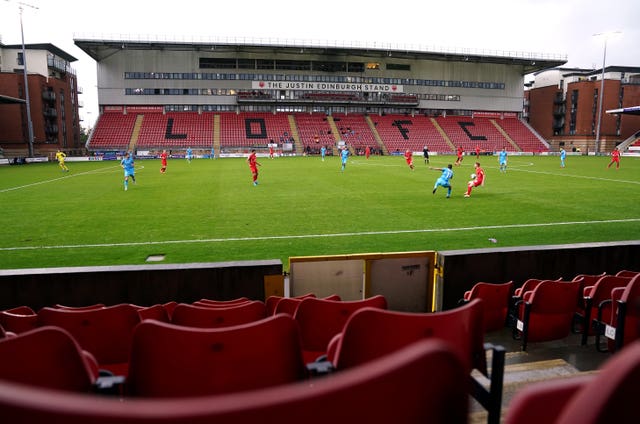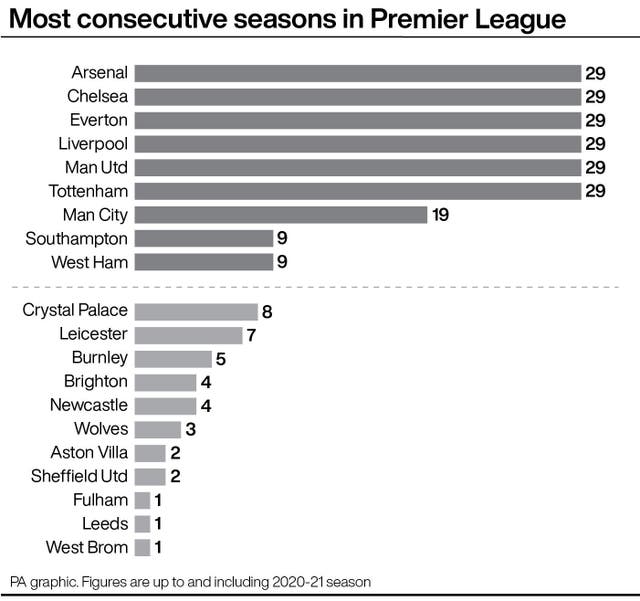Proposals have been drawn up which would see a radical overhaul of the Premier League in an attempt to safeguard the future of clubs below the top flight.
A number of changes are in the plans, called Project Big Picture, and here the PA news agency takes a closer look at what is being proposed.
Why is this happening?

EFL clubs, especially in League One and Two, have been feeling the financial squeeze for some time and the coronavirus pandemic and the knock-on effect of fans not being allowed into grounds has only intensified the situation. They are hoping for a bail-out from the Premier League, which benefits from massive television revenues, but a long-term solution would guarantee long-term stability.
Who has instigated the plan?
The plan has been three years in the making with Liverpool and Manchester United, England’s two most successful and powerful clubs, at the forefront. Rick Parry, the Premier League’s original chief executive, has been in place at the EFL just over a year and has been working on a solution to the perennial funding problem, claiming parachute payments (which clubs receive when they are relegated) are an “evil that needs to be eradicated”. He is fully onboard with the plans and believes the majority of EFL clubs will be too.
Why are the plans controversial?

There are wide-ranging proposals dealing with everything from league reorganisation to capping away ticket prices. However, among the most contentious are reducing the Premier League to 18 teams, with the club finishing 16th in the Premier League joining a play-off with Championship teams in third, fourth and fifth, and greater voting rights given to the nine longest-serving Premier League clubs. The League Cup and Community Shield would also be discontinued.
So how does this benefit the EFL?
The proposal, on adoption of the plan, is for an immediate £350million rescue package to the EFL and Football Association (£250million/£100m), followed by annual solidarity payments to the EFL of 25 per cent of Premier League revenue (up from four per cent) and a yearly infrastructure funding package of six per cent of Premier League gross revenues to be distributed to the top four divisions.
What will be the opposition to it?
The Premier League urges football's stakeholders to work together for the good of the game
Statement: https://t.co/07F9hVHoR8 pic.twitter.com/l8WeHtIt9x
— Premier League (@premierleague) October 11, 2020
If adopted Project Big Picture would place the power in the hands of the established so-called ‘Big Six’ – Liverpool, Manchester United, Manchester City, Arsenal, Chelsea and Tottenham – with the nine longest-serving clubs having unprecedented power, with the votes of just six of them required to make major changes. That obviously takes the power away from the other top-flight sides who currently enjoy one-club, one-vote status, with a majority of 14 currently required for any significant decisions to be passed.
/https%3A%2F%2Fsportsmole-media-prod.s3.gra.io.cloud.ovh.net%2F20%2F30%2Fliverpool.jpg)
/https%3A%2F%2Fsportsmole-media-prod.s3.gra.io.cloud.ovh.net%2F25%2F04%2Ftyrmin.jpg)
/https%3A%2F%2Fsportsmole-media-prod.s3.gra.io.cloud.ovh.net%2Fuploads%2F2025%2F07%2Fimago1062592466-687d37c985b38316030743.jpg)
/https%3A%2F%2Fsportsmole-media-prod.s3.gra.io.cloud.ovh.net%2Fuploads%2F2025%2F11%2Ffotojet-9-692731038841a000413919.jpg)
/https%3A%2F%2Fsportsmole-media-prod.s3.gra.io.cloud.ovh.net%2Fuploads%2F2025%2F11%2Fgimenez-5-69272e6642038898466950.jpg)